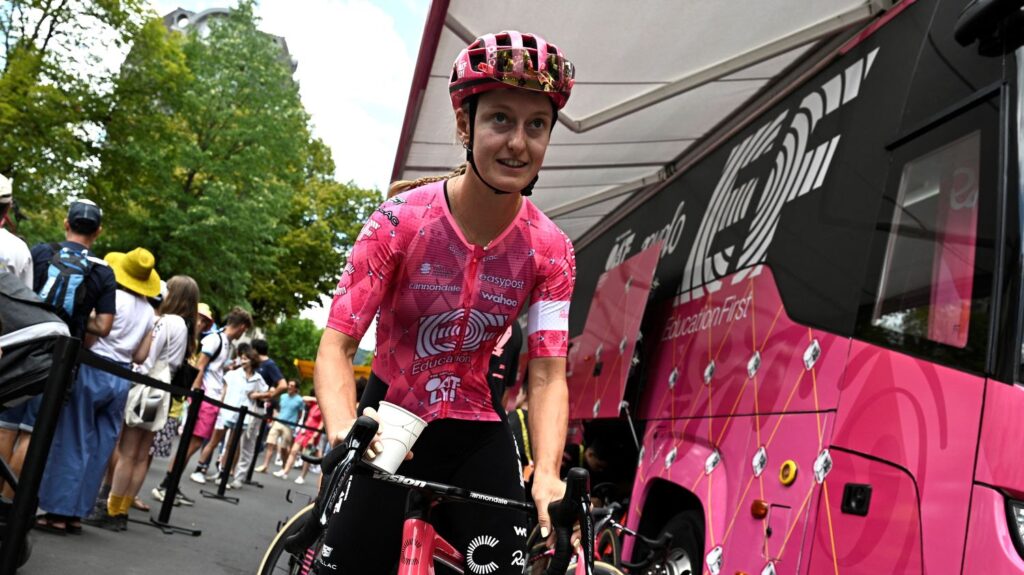
The French runner Cédrine Kerbaol spoke about the risks linked to the search for thinness in the peloton.
/2023/11/23/andrea-rond2-655f9042ecbeb384418639.png)
Published
Reading time: 6min
/2025/08/01/000-68f72lk-688cd4d0dc288549509642.jpg)
“It is not normal to have decalcified bones at 20 years old, it is not normal to no longer have your period.” In an interview given to HumanityWednesday, July 30, the French runner Cédrine Kerbaol highlighted a taboo subject in the peloton. On the TV sets, in the mixed zone or in the press, the French champion 2023 has chosen to break the silence on the consequences of the hunt for kilos in high -level cycling.
6min
In this sport, where the goal is to be as light as possible to shine in the high mountains, where general rankings are played out, the question particularly resonates. “In recent years, it is very fashionable to count each gram on the platesdeveloped Cédrine Kerbaol, herself holding a BTS in dietetics. Many people have won large races with a very light weight and, indirectly, young girls who try to perform will take them for example “.
Behind this frantic race for lightness hides a danger, the medical term of which is identified: that of Red-S (relative Energy DEFICIENCY IN SPORT). The International Olympic Committee introduced it in 2014. It designates an invisible and unknown disease of the general public whose effects occur when caloric intake is no longer enough to cover energy expenditure in the race and/or training. You should know that a professional cyclist can burn up to 10,000 calories in one day. This imbalance is sometimes unconscious but affects hormonal, bone, digestive and even mental health.
“Before, we talked about the sports woman's triadrecalls the dietician of sport Nouchka Simic, of the @nouchkadiet account. Today, we know that it also affects men, with other signals such as loss of libido or sleep disorders. “ The problem, she says, is only to want too much “Eat well”some athletes undoubtedly undress. “When you spend so much energy, eating too healthy can actually become a risk”, she summarizes.
In cycling, where the Watts/Kilos ratio (in other words power/weight) is king, the temptation is great to win a few grams. But for Cédrine Kerbaol, the danger also comes from the environment, and from certain harmless remarks : “People said to me: 'Oh there, you're sharp, it's going to work!' They think they are doing well, but it leaves traces. “ The impact is all the stronger since these remarks often come from experienced but not trained supervisors to these questions.
“Everyone has models. If we see that the biggest gain with a very low weight, young people will try to copy”notes Nouchka Simic, dietitian of sport. A mimicry reinforced by the modern obsession of clean eatingthis ultra-controlled and refined diet. “The reality is that if we do not integrate these foods and if we try to eat too healthy, we will not necessarily be able to cover the needs because we do not eat enough”she explains.
The consequences are not “Do not always see right awaywarns Matthieu Muller, doctor of the Cofidis team, to AFP. But too low a fatty mass can lead to the absence of rules, then to osteoporosis. It should not be surprised if one day a runner fractures the cervical and finds himself paraplegic “. In the background, repeated injuries, anxious or depressive disorders, and sometimes broken careers.
The most worrying? The majority of cases pass under radars. “Often, it's not voluntaryinsists dietician Nouchka Simic. The athletes are not always aware of what is happening to them, and the coaches either. You have to be accompanied, because you are never objective towards yourself “. Faced with this reality, initiatives multiply timidly. Cédrine Kerbaol created, with teammates, The Instagram Compens @Feed_powr To look at food disorders and their consequences on the health of runners. She talks about discussions with the SFCC, the French runner union, to create a bridge with health professionals. “This is the medium and long -term goal”she said, hoping that her speaking “Help breaking the taboo”.
The extent of the problem is not confined to the borders of the female peloton. According to the IOC, 15 to 80% of elite athletes, women and men, are concerned. The fork is a wide desire because of the difficulty in identifying this disorder. Influenced by heroic accounts of social networks, amateurs also do not escape it, especially since they are more and more numerous to prepare funds, such as marathons or ultra-trails.
/https%3A%2F%2Fassets.webservices.francetelevisions.fr%2Fv1%2Fassets%2Fimages%2F4a%2Fc6%2F3e%2F7d89df71-a3ad-434f-ae01-e42b1d5675e3.jpg)
